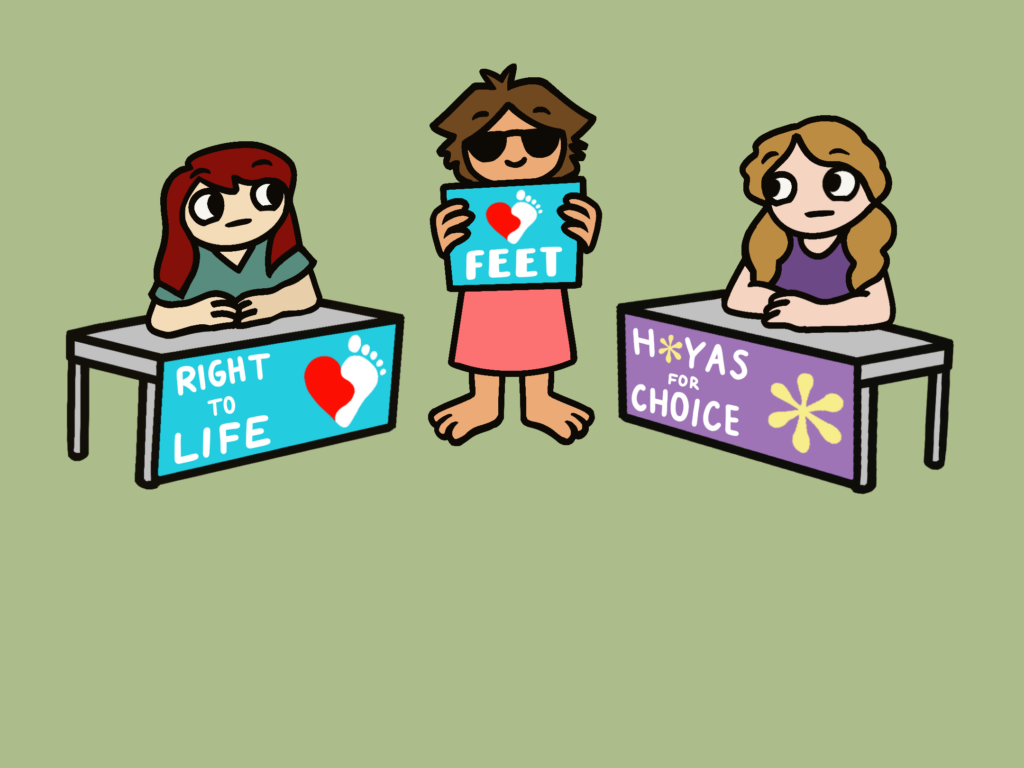A walk through Red Square showcases a wide array of student organizations tabling, including H*yas for Choice (HFC) and Right to Life (RTL), two groups with very different outlooks on the ongoing conversation about abortion access.
With abortion rights across the United States under attack by Republican lawmakers, a new Gallup study found that 72% of currently enrolled college students say that the reproductive health laws in the state where their college is located are “at least somewhat important” to their decision to stay enrolled.
This comes in the aftermath of the U.S. Supreme Court’s Dobbs v. Jackson Women’s Health Organization decision last summer that overturned the 1973 Roe v. Wade ruling that protected abortion access as a constitutional right. This reversal led to nationwide protests, with more than half of U.S. adults saying they disapprove of the overturning of Roe.
Younger adults are especially opposed to the Dobbs decision, with 69% of those under 30 reporting that they disapprove of the ruling.
Lauryn Ping (CAS ’23) said she believes the views of Georgetown University students are no different than those of many other young people on abortion rights.
“I would say a lot of the students on campus are sex-positive and pro-choice,” Ping told The Hoya.
“We’re of reproductive age, and I think people understand the consequences of an unexpected pregnancy while in college and how disruptive that would be to not only your education experience but also potentially your career,” Ping said.
However, not all students on Georgetown’s campus say they support abortion rights, including Paige Foster (CAS ’26), who joined RTL last fall.
“It felt a little bit like social suicide in a way, but it’s also something that I believed really strongly in,” Foster told The Hoya.
Since the Dobbs decision, 14 U.S. states have banned abortion entirely, and a 15th, Georgia, currently has a six-week ban. Experts say around 10 more states are trying to limit the procedure, with many embroiled in legal battles over bans.
A federal judge in Texas controversially sought to impose a nationwide ban on mifepristone, a pill for medication abortions, but the U.S. Supreme Court ruled that the drug would remain available. Mifepristone is used for half of abortions in the United States.
On-Campus History of Abortion Advocacy

As a Catholic university, Georgetown maintains the official anti-abortion position of the church. Abortions are not available through Georgetown University MedStar Hospital nor through on-campus health resources.
RTL, formerly known as Vita Saxa, has official club recognition, meaning they are entitled to university funding and meeting spaces.
Originally named G.U. Choice at its 1991 founding, HFC held university recognition under the status of a discussion group. The decision enraged Catholic theological and political leaders, with over 1,500 signing a petition to strip Georgetown of its Catholic status.
However, the short-lived period of official recognition ended in 1992, when HFC violated an agreement it held with the university by taking direct action advocating for abortion rights. The group pivoted, renaming itself H*yas for Choice, with the asterisk reflecting their inability to use the word “Hoyas.”
Ping said the lack of recognition from the university is particularly disheartening.
“The fact that the university doesn’t support reproductive justice means that they don’t care about our bodily autonomy, they don’t care about our rights and our ability to control our own futures and all these things,” Ping said.
Despite the difficulties that come with not being formally recognized by the university, Soraya Bata (SFS ’24), HFC’s co-director of advocacy, said the group is not attempting to regain that status.
“We’re doing just fine on our own,” Bata told The Hoya. “We love having the freedom and the independence to be able to act as our own group without university oversight, and just being held accountable by our members is enough.”
“We feel supported on campus even though we’re not supported by the administration,” Bata added. “The administration is just such a small part of the actual Georgetown community.”
A 2016 report from the National Institutes of Health found that 81% of all college students knew of at least two on-campus sources that provide free condoms. Georgetown does not provide students with free condoms, a gap that HFC aims to fill.
H*yas for Choice distributes over 10,000 contraceptives per semester and between five and 10 “Plan B” pills each week, according to Ping. She added that despite tension between the two groups, HFC fulfills a necessary role of educating students on reproductive justice.
HFC often has members present in Red Square, with roughly 140 volunteers who table each semester, according to Ping.
“I’m grateful to the university for designating those spaces to students so we can safely distribute contraceptives without legal repercussions or academic repercussions,” Ping said.
Elizabeth Oliver (CAS ’26), the rising president of RTL, said that while best known for its advocacy against abortion rights, RTL also devotes time to supporting the elimination of both the death penalty and euthanasia, which intentionally ends the life of a patient.
“Our mission is to support and promote the dignity of human life from the moment of conception to natural death,” Oliver said.
According to Foster, while RTL has a strong internal sense of community, some pro-abortion access students are put off when they learn of her involvement in the organization.
“It makes you hesitate to tell people, ‘Oh, what are you involved in?,’” Foster said. “You know, that’s like a very Georgetown question. You say, ‘Right to Life,’ and then people look a little taken back.”
In addition to tabling, Right for Life has a history of bringing anti-abortion speakers to campus, including Abby Johnson, a former Planned Parenthood administrator turned anti-abortion advocate, and Sen. Marsha Blackburn (R-TN), an anti-abortion Tennessee Republican known for her years-long feud with Taylor Swift over issues including LGBTQ+ rights.
Members also volunteer at the Northwest Pregnancy Center, an anti-abortion rights resource center Georgetown students founded in 1981.
HFC members can only table at select free speech spaces on campus, including Red Square, where they can collect donations and hand out free contraceptives — things they are unable to do formally through the university. Official clubs are not bound by such restrictions.
“As long as we have the free speech zone on campus, which is where we’re allowed to table, then we can function completely as a full student group,” Bata said.
After the Dobbs decision, activists across the country responded with protests outside of state legislative buildings and in city streets from Miami to Minneapolis. When the U.S. Supreme Court’s decision was leaked last spring, members of the Georgetown community, including members of HFC, protested in front of the Supreme Court.
Since the Dobbs decision, the conversation around abortion has become more amplified among students and the administration, according to Bata.
“These decisions from the Supreme Court, the one good thing about them is they’re mobilizing people,” Bata said. “They’re getting people angry, and they’re getting people incentivized to work for reproductive justice.”
Campus Discourse
One of the most contentious battles between the anti-abortion and pro-abortion rights communities on campus is the Cardinal O’Connor Conference on Life (OCC), which Georgetown hosts annually. The conference is the largest student-run anti-abortion conference in the United States.
More than 120 students gathered in January to protest the conference at a rally that HFC organized. Georgetown University College Democrats also circulated a petition against this year’s OCC, which received 126 student signatures.
This year the conference held a mass for life and hosted various speakers, including Jeanne Mancini, the president of the March for Life Education and Defense Fund, and Bishop Joseph N. Perry, who led the religious service.
“They offered a lot of different resources for women, like housing assistance, financial assistance, academic assistance,” Foster said. “There were also post-abortion counseling groups and leftist organizations who were pro-life.”
HFC countered the conference, hosting a protest in front of the John Carroll statue on the morning of the event and organizing an online nondonation petition, which earned over 600 signatures, according to Ping.
Julian Andres Jimenez Angarita (CAS ’24) was the co-director of the conference and said the experience was formative.
“I believe very strongly in the pro-life position and I really do seek to convince people of it,” Jimenez Angarita said.
The Georgetown BiPartisan Coalition hosted the “Student Abortion Panel (A Presentation of Perspectives)”, a formal debate between pro-abortion rights and anti-abortion students, this semester.
The event featured two moderators, one anti-abortion and one pro-abortion rights, and three representatives from each side. Each panelist presented their position, but the two groups did not respond directly to each other.
Ping said HFC decided not to participate in this event as the organization aims to present abortions as health care, not an issue of debate.
“In an ideal world, it wouldn’t be a political topic and people on both sides of the aisle would be trying to find the best way to ensure people have access to care rather than debating whether people should or should not be able to at all,” Ping said.
“I think also sitting on a panel where people are debating whether or not you have human rights is kind of a degrading experience,” Ping added.
RTL did have participants in the event representing the anti-abortion side. Oliver said she felt that HFC should have engaged in the conversation.
“As an adult, you should be able to have a respectful conversation with somebody who disagrees with you on difficult issues,” Oliver said. “I wish that Georgetown could do a better job at facilitating that.”
RTL was also the subject of conversation at this semester’s CAB Fair, where they had a young child at their table whose mother is an RTL member.
“It was not intentional,” Oliver said. “She’s a member. She’s very passionate about the issue. She’s a woman who chose life.”
Right to Feet Steps Into the Conversation
Some students have also taken to humor in the discourse between HFC and RTL. One such example is The Heckler, an on-campus publication.
In February 2023, The Heckler brought their “Right to Feet” table to Red Square, featuring a table with the RTL logo on a banner and members of The Heckler sticking their bare feet out to passersby.
Members of the Heckler said the enlarged feet on the RTL logo inspired them, according to David Edwards (CAS ’24), the co-editor-in-chief of The Heckler.
Edwards and Evelyn Blanchett (CAS ’25), the other co-editor-in-chief, piloted the joke, unsure of what students’ reactions would be.
“We were there all day just kind of sitting there, and not only were people coming up and congratulating us and asking if people could take their shoes off and take a picture with us, but some people were asking if we needed food or if they could get anything for us,” Blanchett told The Hoya.
Members of both HFC and RTL said they found the joke intriguing.
“I mean, I will give it to them,” Foster said. “It was clever, right?”
“I think using humor to make a political point is very effective,” Ping said.
Members of The Heckler also donated to Planned Parenthood under RTL’s name, something Jimenez Angarita said he disapproved of.
The Heckler publicly announced their $300 donation to Planned Parenthood in honor of RTL in a March 6 Instagram post.
As the one-year anniversary of the Dobbs decision approaches and legal battles continue in regional and federal courts, each group says they will continue public advocacy efforts to further their cause.
“We just want to keep the student body as informed as possible,” Bata said. “We believe that information is power.”








